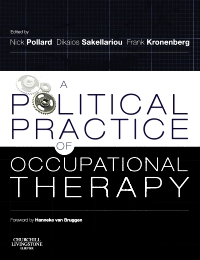
A Political Practice of Occupational Therapy, 1st Edition
Paperback

Now $53.89
This challenging and innovative book explores the political aspects of occupational therapy. It looks at how practitioners may develop political awareness in order to aid community development. A Political Practice of Occupational Therapy is about maximizing the potential impact of occupational therapists' engagements and ensuring the profession is working towards the contruction of a civic society. It is supported by twelve chapters of practice examples from the UK, US, Georgia and Australia, as well as a history of the profession as an agency for social change.
It asks:
- How is it possible to introduce the political into a profession that is linked to health and social care?
- What form could political practice take, and how could the political components of practice be analyzed and evaluated?
It includes significant theoretical chapters on gender, class and sexuality, challenges to holism, occupational literacy, and a discussion of political competence. This book will be of particular use for students exploring community and emerging role settings, client centred practice, occupational and social justice and the theoretical base of the profession.
From an editorial team that is widely recognized for their challenges to traditional thought and practice in occupational therapy, this book will be of value not just to occupational therapists but also those employed in health profession management and development, and community based rehabilitation.
-
List of Contributors. Foreword by Hanneke van Bruggen. Preface. Acknowledgements. Introduction. Section 1: Theory. Chapter 1 - A political practice of occupational therapy (Nick Pollard, Frank Kronenberg, Dikaios Sakellariou). Chapter 2 - Political competence in occupational therapy - (Nick Pollard, Dikaios Salellariou, Frank Kronenberg). Chapter 3 - When Adam delf and Eve span: occupational literacy and democracy (Nick Pollard). Section 2: Explorations of context. Chapter 4 - Occupational apartheid (Nick Pollard, Frank Kronenberg, Dikaios Sakellariou). Chapter 5 - Three sites of conflict and co-operation: class, gender and sexuality (Dikaios Sakellariou). Chapter 6 - Political challenges of holism: hetroglossia and the (im)plausibilty of holism (Dikaios Sakellariou, Nick Pollard). Section 3: Practice. Chapter 7 - Occupational therapy foundations for political engagement and social transformation (Gelya Frank, Ruth Zemke). Chapter 8 - Encouraging student consciousness of the political through community fieldwork (Alison J. Beck, Karin J. Barnes). Chapter 9 - Enacting pADL's in occupational therapy education: health care disparities in Oregon (Tiffany Boggis).Chapter 10 - Individual blame or systemic failure? Re-evaluating occupational disengagement in an Indigenous community (Tamar Paluch, Shana Boltin, Linsey Howie). Chapter 11 - Political practice in occupational therapy in Georgia: 'challenging change' through social action (Maria Kapanadze, Medea Despotashvili, Nino Skhirtladze). Chapter 12 - When the therapist met the evangelists. A story of the enablement of an inner-city community (Julie Coleman, Jeff and Vanessa Kirby). Chapter 13 - The Sleaford MACA Group (Catherine McNulty). Chapter 14 - The Transatlantic Fed: from individual stories of disability to collective action (Brendan Abel, Melodie Clarke, Stephen Parks). Chapter 15 - Working with asylum seekers: challenging occupational apartheid (Richard Davies). Chapter 16 - Illustrating occupational needs of refugees (Clarissa Wilson). Chapter 17 - Reflections on working with South Sudanese refugees in settlement and capacity building a regional Australia (Andrina Mitchell). Chapter 18 - Forging partnerships to address health related needs: targetting embedded rural communities in the horseracing industry (Karin J. Opacich, Shannon Lizer, Peggy Goetsch). Chapter 19 - Occupational therapy with Native American youth (Maggie Hotch-Heyman). Chapter 20 - Postcolonial practice in occupational therapy: the Tule River Tribal History Project (Gelya Frank, Heather J. Kitching). Chapter 21 - Facing the challenge: a compass for navigating the heteroglossic content (Nick Pollard, Dikaios Sakellariou). Index.

 as described in our
as described in our 